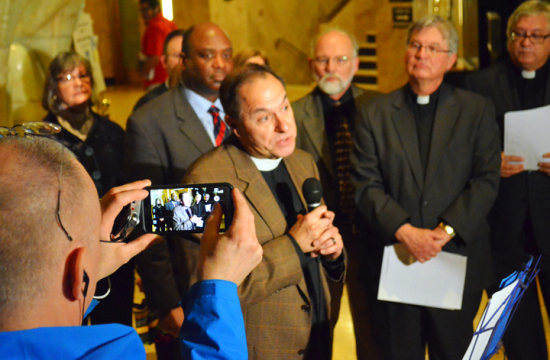

Share
Faith leaders from St. Paul gathered in City Hall Tuesday to support a citywide ordinance guaranteeing workers access to earned sick and safe time.
“The Scripture says we are one body, and when one part of the body suffers, the whole body suffers,” Pastor Ralph Baumgartner said. “And when 42 percent of workers in our community can’t care for themselves or their family members when they are sick, our community is broken.”
About 20 clergy members, members of the ISAIAH network, staged a brief press conference before delivering hand-written notes to their city council members. The organization, which works for social justice in the Twin Cities, is “launching a faith-led effort” to garner support for a sick-time ordinance.
Already, clergy members have met with more than 40 business owners to discuss the parameters of a potential ordinance, and plans are in the works to engage over 1,000 people in 40 congregations on the issue. Pastor Grant Stevensen, a leader of ISAIAH, said no one should be forced to choose between working while sick and not being able to pay their rent or utilities.
“We know too many workers in our congregations who are forced to make that choice,” Stevensen said.
The issue has public-health implications as well. A 2014 study by the Institute for Women’s Policy Research found that only 24 percent of food preparation and service workers have access to earned sick and safe time. In Minnesota, at least 208 outbreaks of foodborne illness were linked to employees working while sick between 2004 and 2013.
“This is not controversial. This is common sense,” Baumgartner said. “If you can’t rest when you’re sick, you don’t get better.”
Bradley Schmeling, pastor at Gloria Dei Lutheran, remembered waiting tables in a restaurant while he was in graduate school, when rent and other obligations left him no choice but to work whether healthy or sick.
“But increasingly, many workers aren’t in low paying jobs with no sick time because they’re working their way through school or working their way up the ladder,” Schmeling said. “They are working those jobs permanently.”
Clergy members also said guaranteeing access to earned sick time would help address the region’s glaring racial disparities. Baumgartner, pastor at Hope Lutheran Church, pointed to statistics showing black workers are 25 percent less likely than white workers to have the benefit, and Latino workers about 30 percent less likely.
“If we believe that black lives matter, then we must build systems and structures that make the playing field equal and fair and just,” he said.
Mayor Chris Coleman and council members are waiting on the recommendations of a task force considering the issue. It’s estimated that more than 70,000 workers in St. Paul do not have access to earned sick and safe time benefits.
“My prayer is that the city of St. Paul will be a leader,” Baumgartner said.

